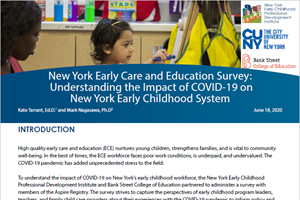New York ECE Workforce Survey: Understanding the Impact of COVID-19
To understand the impact of COVID-19 on New York’s early childhood workforce, the New York Early Childhood Professional Development Institute and Bank Street College of Education partnered to administer a survey with members of the Aspire Registry. The survey strives to capture the perspectives of early childhood program leaders, teachers, and family child care providers about their experiences with the COVID-19 pandemic to inform policy and practice.
We heard from more than 3,355 early childhood educators and leaders throughout the state. It was our hope to capture their stories and share their wisdom with key partners as our field navigates these challenging times.
In the full report: New York Early Care and Education Survey: Understanding the Impact of COVID-19 on New York Early Childhood System and the Executive Summary, we articulate several key findings:
- The emotional stress of the pandemic has been more significant than concerns for health and financial stress, and educators requested mental health supports.
- Most of the respondents were working remotely. Approximately 70% were engaged in distance instruction in New York City, whereas half were providing distance instruction in the rest of state. Approximately 1 in 5 program leaders reported that their program was closed and providing no services.
- Remote instruction was frequent, yet educators reported struggling with (1) Delivering engaging and developmentally appropriate approaches (2) Needing more consistent access to technology and appropriate learning materials for teachers and families; and (3) Managing the expectations associated with remote instruction, particularly related to documentation of time and effort
- Approximately 60% of program leaders reported that they are fully paying their staff. Programs funded through family fees, as opposed to public funds, were most frequently closed and had furloughed or laid off staff.
- The data showed that early childhood educators and leaders were deeply committed to providing young children and their families with appropriate and responsive early care and education.
The data from the survey have also inspired numerous posts on our Teaching, Leading and Caring blog. Each post shares quotes and provides insights about resources that we hope the field will find supportive in their work.
Telling Early Childhood Educators’ Stories
Public Investments Stabilize Early Care and Education
Equitable Access to Technology for Remote Learning
Supports for Family Child Care Providers during the Pandemic
Collaborating as a Teaching Team During the Pandemic
Learning from Family Engagement and Empowerment During COVID
Social-Emotional Family and Child Engagement While Remote Teaching
A Better Model for Remote Learning in Early Childhood
Self-Care and Healthy Boundaries

